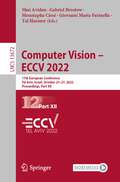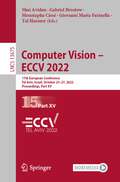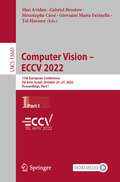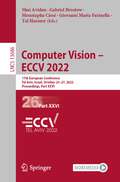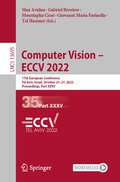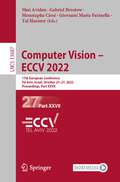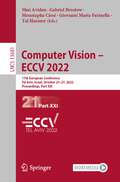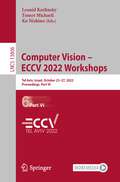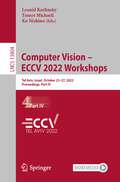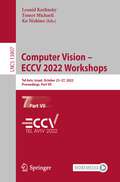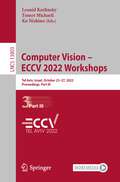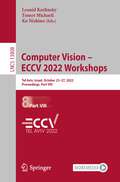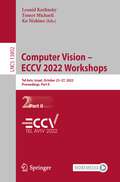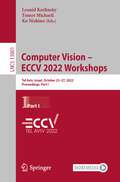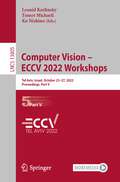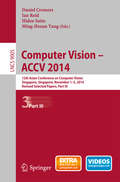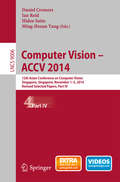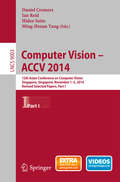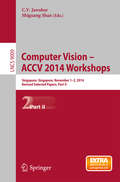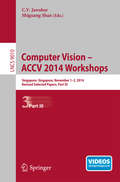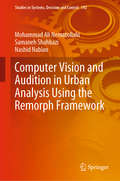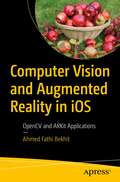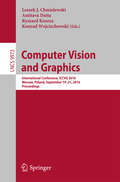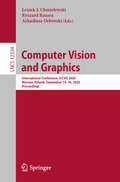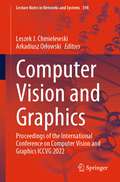- Table View
- List View
Computer Vision – ECCV 2022: 17th European Conference, Tel Aviv, Israel, October 23–27, 2022, Proceedings, Part XII (Lecture Notes in Computer Science #13672)
by Shai Avidan Gabriel Brostow Moustapha Cissé Giovanni Maria Farinella Tal HassnerThe 39-volume set, comprising the LNCS books 13661 until 13699, constitutes the refereed proceedings of the 17th European Conference on Computer Vision, ECCV 2022, held in Tel Aviv, Israel, during October 23–27, 2022. The 1645 papers presented in these proceedings were carefully reviewed and selected from a total of 5804 submissions. The papers deal with topics such as computer vision; machine learning; deep neural networks; reinforcement learning; object recognition; image classification; image processing; object detection; semantic segmentation; human pose estimation; 3d reconstruction; stereo vision; computational photography; neural networks; image coding; image reconstruction; object recognition; motion estimation.
Computer Vision – ECCV 2022: 17th European Conference, Tel Aviv, Israel, October 23–27, 2022, Proceedings, Part XV (Lecture Notes in Computer Science #13675)
by Shai Avidan Gabriel Brostow Moustapha Cissé Giovanni Maria Farinella Tal HassnerThe 39-volume set, comprising the LNCS books 13661 until 13699, constitutes the refereed proceedings of the 17th European Conference on Computer Vision, ECCV 2022, held in Tel Aviv, Israel, during October 23–27, 2022. The 1645 papers presented in these proceedings were carefully reviewed and selected from a total of 5804 submissions. The papers deal with topics such as computer vision; machine learning; deep neural networks; reinforcement learning; object recognition; image classification; image processing; object detection; semantic segmentation; human pose estimation; 3d reconstruction; stereo vision; computational photography; neural networks; image coding; image reconstruction; object recognition; motion estimation.
Computer Vision – ECCV 2022: 17th European Conference, Tel Aviv, Israel, October 23–27, 2022, Proceedings, Part I (Lecture Notes in Computer Science #13661)
by Shai Avidan Gabriel Brostow Moustapha Cissé Giovanni Maria Farinella Tal HassnerThe 39-volume set, comprising the LNCS books 13661 until 13699, constitutes the refereed proceedings of the 17th European Conference on Computer Vision, ECCV 2022, held in Tel Aviv, Israel, during October 23–27, 2022.The 1645 papers presented in these proceedings were carefully reviewed and selected from a total of 5804 submissions. The papers deal with topics such as computer vision; machine learning; deep neural networks; reinforcement learning; object recognition; image classification; image processing; object detection; semantic segmentation; human pose estimation; 3d reconstruction; stereo vision; computational photography; neural networks; image coding; image reconstruction; object recognition; motion estimation.
Computer Vision – ECCV 2022: 17th European Conference, Tel Aviv, Israel, October 23–27, 2022, Proceedings, Part XXVI (Lecture Notes in Computer Science #13686)
by Giovanni Maria Farinella Tal Hassner Shai Avidan Gabriel Brostow Moustapha CisséThe 39-volume set, comprising the LNCS books 13661 until 13699, constitutes the refereed proceedings of the 17th European Conference on Computer Vision, ECCV 2022, held in Tel Aviv, Israel, during October 23–27, 2022. The 1645 papers presented in these proceedings were carefully reviewed and selected from a total of 5804 submissions. The papers deal with topics such as computer vision; machine learning; deep neural networks; reinforcement learning; object recognition; image classification; image processing; object detection; semantic segmentation; human pose estimation; 3d reconstruction; stereo vision; computational photography; neural networks; image coding; image reconstruction; object recognition; motion estimation.
Computer Vision – ECCV 2022: 17th European Conference, Tel Aviv, Israel, October 23–27, 2022, Proceedings, Part XXXV (Lecture Notes in Computer Science #13695)
by Giovanni Maria Farinella Tal Hassner Shai Avidan Gabriel Brostow Moustapha CisséThe 39-volume set, comprising the LNCS books 13661 until 13699, constitutes the refereed proceedings of the 17th European Conference on Computer Vision, ECCV 2022, held in Tel Aviv, Israel, during October 23–27, 2022. The 1645 papers presented in these proceedings were carefully reviewed and selected from a total of 5804 submissions. The papers deal with topics such as computer vision; machine learning; deep neural networks; reinforcement learning; object recognition; image classification; image processing; object detection; semantic segmentation; human pose estimation; 3d reconstruction; stereo vision; computational photography; neural networks; image coding; image reconstruction; object recognition; motion estimation.
Computer Vision – ECCV 2022: 17th European Conference, Tel Aviv, Israel, October 23–27, 2022, Proceedings, Part XXVII (Lecture Notes in Computer Science #13687)
by Giovanni Maria Farinella Tal Hassner Shai Avidan Gabriel Brostow Moustapha CisséThe 39-volume set, comprising the LNCS books 13661 until 13699, constitutes the refereed proceedings of the 17th European Conference on Computer Vision, ECCV 2022, held in Tel Aviv, Israel, during October 23–27, 2022. The 1645 papers presented in these proceedings were carefully reviewed and selected from a total of 5804 submissions. The papers deal with topics such as computer vision; machine learning; deep neural networks; reinforcement learning; object recognition; image classification; image processing; object detection; semantic segmentation; human pose estimation; 3d reconstruction; stereo vision; computational photography; neural networks; image coding; image reconstruction; object recognition; motion estimation.
Computer Vision – ECCV 2022: 17th European Conference, Tel Aviv, Israel, October 23–27, 2022, Proceedings, Part XXI (Lecture Notes in Computer Science #13681)
by Giovanni Maria Farinella Tal Hassner Shai Avidan Gabriel Brostow Moustapha CisséThe 39-volume set, comprising the LNCS books 13661 until 13699, constitutes the refereed proceedings of the 17th European Conference on Computer Vision, ECCV 2022, held in Tel Aviv, Israel, during October 23–27, 2022. The 1645 papers presented in these proceedings were carefully reviewed and selected from a total of 5804 submissions. The papers deal with topics such as computer vision; machine learning; deep neural networks; reinforcement learning; object recognition; image classification; image processing; object detection; semantic segmentation; human pose estimation; 3d reconstruction; stereo vision; computational photography; neural networks; image coding; image reconstruction; object recognition; motion estimation.
Computer Vision – ECCV 2022 Workshops: Tel Aviv, Israel, October 23–27, 2022, Proceedings, Part VI (Lecture Notes in Computer Science #13806)
by Leonid Karlinsky Tomer Michaeli Ko NishinoThe 8-volume set, comprising the LNCS books 13801 until 13809, constitutes the refereed proceedings of 38 out of the 60 workshops held at the 17th European Conference on Computer Vision, ECCV 2022. The conference took place in Tel Aviv, Israel, during October 23-27, 2022; the workshops were held hybrid or online.The 367 full papers included in this volume set were carefully reviewed and selected for inclusion in the ECCV 2022 workshop proceedings. They were organized in individual parts as follows: Part I: W01 - AI for Space; W02 - Vision for Art; W03 - Adversarial Robustness in the Real World; W04 - Autonomous Vehicle Vision Part II: W05 - Learning With Limited and Imperfect Data; W06 - Advances in Image Manipulation; Part III: W07 - Medical Computer Vision; W08 - Computer Vision for Metaverse; W09 - Self-Supervised Learning: What Is Next?; Part IV: W10 - Self-Supervised Learning for Next-Generation Industry-Level Autonomous Driving; W11 - ISIC Skin Image Analysis; W12 - Cross-Modal Human-Robot Interaction; W13 - Text in Everything; W14 - BioImage Computing; W15 - Visual Object-Oriented Learning Meets Interaction: Discovery, Representations, and Applications; W16 - AI for Creative Video Editing and Understanding; W17 - Visual Inductive Priors for Data-Efficient Deep Learning; W18 - Mobile Intelligent Photography and Imaging; Part V: W19 - People Analysis: From Face, Body and Fashion to 3D Virtual Avatars; W20 - Safe Artificial Intelligence for Automated Driving; W21 - Real-World Surveillance: Applications and Challenges; W22 - Affective Behavior Analysis In-the-Wild; Part VI: W23 - Visual Perception for Navigation in Human Environments: The JackRabbot Human Body Pose Dataset and Benchmark; W24 - Distributed Smart Cameras; W25 - Causality in Vision; W26 - In-Vehicle Sensing and Monitorization; W27 - Assistive Computer Vision and Robotics; W28 - Computational Aspects of Deep Learning; Part VII: W29 - Computer Vision for Civil and Infrastructure Engineering; W30 - AI-Enabled Medical Image Analysis: Digital Pathology and Radiology/COVID19; W31 - Compositional and Multimodal Perception; Part VIII: W32 - Uncertainty Quantification for Computer Vision; W33 - Recovering 6D Object Pose; W34 - Drawings and Abstract Imagery: Representation and Analysis; W35 - Sign Language Understanding; W36 - A Challenge for Out-of-Distribution Generalization in Computer Vision; W37 - Vision With Biased or Scarce Data; W38 - Visual Object Tracking Challenge.
Computer Vision – ECCV 2022 Workshops: Tel Aviv, Israel, October 23–27, 2022, Proceedings, Part IV (Lecture Notes in Computer Science #13804)
by Leonid Karlinsky Tomer Michaeli Ko NishinoThe 8-volume set, comprising the LNCS books 13801 until 13809, constitutes the refereed proceedings of 38 out of the 60 workshops held at the 17th European Conference on Computer Vision, ECCV 2022. The conference took place in Tel Aviv, Israel, during October 23-27, 2022; the workshops were held hybrid or online.The 367 full papers included in this volume set were carefully reviewed and selected for inclusion in the ECCV 2022 workshop proceedings. They were organized in individual parts as follows: Part I: W01 - AI for Space; W02 - Vision for Art; W03 - Adversarial Robustness in the Real World; W04 - Autonomous Vehicle Vision Part II: W05 - Learning With Limited and Imperfect Data; W06 - Advances in Image Manipulation; Part III: W07 - Medical Computer Vision; W08 - Computer Vision for Metaverse; W09 - Self-Supervised Learning: What Is Next?; Part IV: W10 - Self-Supervised Learning for Next-Generation Industry-Level Autonomous Driving; W11 - ISIC Skin Image Analysis; W12 - Cross-Modal Human-Robot Interaction; W13 - Text in Everything; W14 - BioImage Computing; W15 - Visual Object-Oriented Learning Meets Interaction: Discovery, Representations, and Applications; W16 - AI for Creative Video Editing and Understanding; W17 - Visual Inductive Priors for Data-Efficient Deep Learning; W18 - Mobile Intelligent Photography and Imaging; Part V: W19 - People Analysis: From Face, Body and Fashion to 3D Virtual Avatars; W20 - Safe Artificial Intelligence for Automated Driving; W21 - Real-World Surveillance: Applications and Challenges; W22 - Affective Behavior Analysis In-the-Wild; Part VI: W23 - Visual Perception for Navigation in Human Environments: The JackRabbot Human Body Pose Dataset and Benchmark; W24 - Distributed Smart Cameras; W25 - Causality in Vision; W26 - In-Vehicle Sensing and Monitorization; W27 - Assistive Computer Vision and Robotics; W28 - Computational Aspects of Deep Learning; Part VII: W29 - Computer Vision for Civil and Infrastructure Engineering; W30 - AI-Enabled Medical Image Analysis: Digital Pathology and Radiology/COVID19; W31 - Compositional and Multimodal Perception; Part VIII: W32 - Uncertainty Quantification for Computer Vision; W33 - Recovering 6D Object Pose; W34 - Drawings and Abstract Imagery: Representation and Analysis; W35 - Sign Language Understanding; W36 - A Challenge for Out-of-Distribution Generalization in Computer Vision; W37 - Vision With Biased or Scarce Data; W38 - Visual Object Tracking Challenge.
Computer Vision – ECCV 2022 Workshops: Tel Aviv, Israel, October 23–27, 2022, Proceedings, Part VII (Lecture Notes in Computer Science #13807)
by Leonid Karlinsky Tomer Michaeli Ko NishinoThe 8-volume set, comprising the LNCS books 13801 until 13809, constitutes the refereed proceedings of 38 out of the 60 workshops held at the 17th European Conference on Computer Vision, ECCV 2022. The conference took place in Tel Aviv, Israel, during October 23-27, 2022; the workshops were held hybrid or online.The 367 full papers included in this volume set were carefully reviewed and selected for inclusion in the ECCV 2022 workshop proceedings. They were organized in individual parts as follows: Part I: W01 - AI for Space; W02 - Vision for Art; W03 - Adversarial Robustness in the Real World; W04 - Autonomous Vehicle Vision Part II: W05 - Learning With Limited and Imperfect Data; W06 - Advances in Image Manipulation; Part III: W07 - Medical Computer Vision; W08 - Computer Vision for Metaverse; W09 - Self-Supervised Learning: What Is Next?; Part IV: W10 - Self-Supervised Learning for Next-Generation Industry-Level Autonomous Driving; W11 - ISIC Skin Image Analysis; W12 - Cross-Modal Human-Robot Interaction; W13 - Text in Everything; W14 - BioImage Computing; W15 - Visual Object-Oriented Learning Meets Interaction: Discovery, Representations, and Applications; W16 - AI for Creative Video Editing and Understanding; W17 - Visual Inductive Priors for Data-Efficient Deep Learning; W18 - Mobile Intelligent Photography and Imaging; Part V: W19 - People Analysis: From Face, Body and Fashion to 3D Virtual Avatars; W20 - Safe Artificial Intelligence for Automated Driving; W21 - Real-World Surveillance: Applications and Challenges; W22 - Affective Behavior Analysis In-the-Wild; Part VI: W23 - Visual Perception for Navigation in Human Environments: The JackRabbot Human Body Pose Dataset and Benchmark; W24 - Distributed Smart Cameras; W25 - Causality in Vision; W26 - In-Vehicle Sensing and Monitorization; W27 - Assistive Computer Vision and Robotics; W28 - Computational Aspects of Deep Learning; Part VII: W29 - Computer Vision for Civil and Infrastructure Engineering; W30 - AI-Enabled Medical Image Analysis: Digital Pathology and Radiology/COVID19; W31 - Compositional and Multimodal Perception; Part VIII: W32 - Uncertainty Quantification for Computer Vision; W33 - Recovering 6D Object Pose; W34 - Drawings and Abstract Imagery: Representation and Analysis; W35 - Sign Language Understanding; W36 - A Challenge for Out-of-Distribution Generalization in Computer Vision; W37 - Vision With Biased or Scarce Data; W38 - Visual Object Tracking Challenge.
Computer Vision – ECCV 2022 Workshops: Tel Aviv, Israel, October 23–27, 2022, Proceedings, Part III (Lecture Notes in Computer Science #13803)
by Leonid Karlinsky Tomer Michaeli Ko NishinoThe 8-volume set, comprising the LNCS books 13801 until 13809, constitutes the refereed proceedings of 38 out of the 60 workshops held at the 17th European Conference on Computer Vision, ECCV 2022. The conference took place in Tel Aviv, Israel, during October 23-27, 2022; the workshops were held hybrid or online.The 367 full papers included in this volume set were carefully reviewed and selected for inclusion in the ECCV 2022 workshop proceedings. They were organized in individual parts as follows: Part I: W01 - AI for Space; W02 - Vision for Art; W03 - Adversarial Robustness in the Real World; W04 - Autonomous Vehicle Vision Part II: W05 - Learning With Limited and Imperfect Data; W06 - Advances in Image Manipulation; Part III: W07 - Medical Computer Vision; W08 - Computer Vision for Metaverse; W09 - Self-Supervised Learning: What Is Next?; Part IV: W10 - Self-Supervised Learning for Next-Generation Industry-Level Autonomous Driving; W11 - ISIC Skin Image Analysis; W12 - Cross-Modal Human-Robot Interaction; W13 - Text in Everything; W14 - BioImage Computing; W15 - Visual Object-Oriented Learning Meets Interaction: Discovery, Representations, and Applications; W16 - AI for Creative Video Editing and Understanding; W17 - Visual Inductive Priors for Data-Efficient Deep Learning; W18 - Mobile Intelligent Photography and Imaging; Part V: W19 - People Analysis: From Face, Body and Fashion to 3D Virtual Avatars; W20 - Safe Artificial Intelligence for Automated Driving; W21 - Real-World Surveillance: Applications and Challenges; W22 - Affective Behavior Analysis In-the-Wild; Part VI: W23 - Visual Perception for Navigation in Human Environments: The JackRabbot Human Body Pose Dataset and Benchmark; W24 - Distributed Smart Cameras; W25 - Causality in Vision; W26 - In-Vehicle Sensing and Monitorization; W27 - Assistive Computer Vision and Robotics; W28 - Computational Aspects of Deep Learning; Part VII: W29 - Computer Vision for Civil and Infrastructure Engineering; W30 - AI-Enabled Medical Image Analysis: Digital Pathology and Radiology/COVID19; W31 - Compositional and Multimodal Perception; Part VIII: W32 - Uncertainty Quantification for Computer Vision; W33 - Recovering 6D Object Pose; W34 - Drawings and Abstract Imagery: Representation and Analysis; W35 - Sign Language Understanding; W36 - A Challenge for Out-of-Distribution Generalization in Computer Vision; W37 - Vision With Biased or Scarce Data; W38 - Visual Object Tracking Challenge.
Computer Vision – ECCV 2022 Workshops: Tel Aviv, Israel, October 23–27, 2022, Proceedings, Part VIII (Lecture Notes in Computer Science #13808)
by Leonid Karlinsky Tomer Michaeli Ko NishinoThe 8-volume set, comprising the LNCS books 13801 until 13809, constitutes the refereed proceedings of 38 out of the 60 workshops held at the 17th European Conference on Computer Vision, ECCV 2022. The conference took place in Tel Aviv, Israel, during October 23-27, 2022; the workshops were held hybrid or online.The 367 full papers included in this volume set were carefully reviewed and selected for inclusion in the ECCV 2022 workshop proceedings. They were organized in individual parts as follows: Part I: W01 - AI for Space; W02 - Vision for Art; W03 - Adversarial Robustness in the Real World; W04 - Autonomous Vehicle Vision Part II: W05 - Learning With Limited and Imperfect Data; W06 - Advances in Image Manipulation; Part III: W07 - Medical Computer Vision; W08 - Computer Vision for Metaverse; W09 - Self-Supervised Learning: What Is Next?; Part IV: W10 - Self-Supervised Learning for Next-Generation Industry-Level Autonomous Driving; W11 - ISIC Skin Image Analysis; W12 - Cross-Modal Human-Robot Interaction; W13 - Text in Everything; W14 - BioImage Computing; W15 - Visual Object-Oriented Learning Meets Interaction: Discovery, Representations, and Applications; W16 - AI for Creative Video Editing and Understanding; W17 - Visual Inductive Priors for Data-Efficient Deep Learning; W18 - Mobile Intelligent Photography and Imaging; Part V: W19 - People Analysis: From Face, Body and Fashion to 3D Virtual Avatars; W20 - Safe Artificial Intelligence for Automated Driving; W21 - Real-World Surveillance: Applications and Challenges; W22 - Affective Behavior Analysis In-the-Wild; Part VI: W23 - Visual Perception for Navigation in Human Environments: The JackRabbot Human Body Pose Dataset and Benchmark; W24 - Distributed Smart Cameras; W25 - Causality in Vision; W26 - In-Vehicle Sensing and Monitorization; W27 - Assistive Computer Vision and Robotics; W28 - Computational Aspects of Deep Learning; Part VII: W29 - Computer Vision for Civil and Infrastructure Engineering; W30 - AI-Enabled Medical Image Analysis: Digital Pathology and Radiology/COVID19; W31 - Compositional and Multimodal Perception; Part VIII: W32 - Uncertainty Quantification for Computer Vision; W33 - Recovering 6D Object Pose; W34 - Drawings and Abstract Imagery: Representation and Analysis; W35 - Sign Language Understanding; W36 - A Challenge for Out-of-Distribution Generalization in Computer Vision; W37 - Vision With Biased or Scarce Data; W38 - Visual Object Tracking Challenge.
Computer Vision – ECCV 2022 Workshops: Tel Aviv, Israel, October 23–27, 2022, Proceedings, Part II (Lecture Notes in Computer Science #13802)
by Leonid Karlinsky Tomer Michaeli Ko NishinoThe 8-volume set, comprising the LNCS books 13801 until 13809, constitutes the refereed proceedings of 38 out of the 60 workshops held at the 17th European Conference on Computer Vision, ECCV 2022. The conference took place in Tel Aviv, Israel, during October 23-27, 2022; the workshops were held hybrid or online.The 367 full papers included in this volume set were carefully reviewed and selected for inclusion in the ECCV 2022 workshop proceedings. They were organized in individual parts as follows: Part I: W01 - AI for Space; W02 - Vision for Art; W03 - Adversarial Robustness in the Real World; W04 - Autonomous Vehicle Vision Part II: W05 - Learning With Limited and Imperfect Data; W06 - Advances in Image Manipulation; Part III: W07 - Medical Computer Vision; W08 - Computer Vision for Metaverse; W09 - Self-Supervised Learning: What Is Next?; Part IV: W10 - Self-Supervised Learning for Next-Generation Industry-Level Autonomous Driving; W11 - ISIC Skin Image Analysis; W12 - Cross-Modal Human-Robot Interaction; W13 - Text in Everything; W14 - BioImage Computing; W15 - Visual Object-Oriented Learning Meets Interaction: Discovery, Representations, and Applications; W16 - AI for Creative Video Editing and Understanding; W17 - Visual Inductive Priors for Data-Efficient Deep Learning; W18 - Mobile Intelligent Photography and Imaging; Part V: W19 - People Analysis: From Face, Body and Fashion to 3D Virtual Avatars; W20 - Safe Artificial Intelligence for Automated Driving; W21 - Real-World Surveillance: Applications and Challenges; W22 - Affective Behavior Analysis In-the-Wild; Part VI: W23 - Visual Perception for Navigation in Human Environments: The JackRabbot Human Body Pose Dataset and Benchmark; W24 - Distributed Smart Cameras; W25 - Causality in Vision; W26 - In-Vehicle Sensing and Monitorization; W27 - Assistive Computer Vision and Robotics; W28 - Computational Aspects of Deep Learning; Part VII: W29 - Computer Vision for Civil and Infrastructure Engineering; W30 - AI-Enabled Medical Image Analysis: Digital Pathology and Radiology/COVID19; W31 - Compositional and Multimodal Perception; Part VIII: W32 - Uncertainty Quantification for Computer Vision; W33 - Recovering 6D Object Pose; W34 - Drawings and Abstract Imagery: Representation and Analysis; W35 - Sign Language Understanding; W36 - A Challenge for Out-of-Distribution Generalization in Computer Vision; W37 - Vision With Biased or Scarce Data; W38 - Visual Object Tracking Challenge.
Computer Vision – ECCV 2022 Workshops: Tel Aviv, Israel, October 23–27, 2022, Proceedings, Part I (Lecture Notes in Computer Science #13801)
by Leonid Karlinsky Tomer Michaeli Ko NishinoThe 8-volume set, comprising the LNCS books 13801 until 13809, constitutes the refereed proceedings of 38 out of the 60 workshops held at the 17th European Conference on Computer Vision, ECCV 2022. The conference took place in Tel Aviv, Israel, during October 23-27, 2022; the workshops were held hybrid or online.The 367 full papers included in this volume set were carefully reviewed and selected for inclusion in the ECCV 2022 workshop proceedings. They were organized in individual parts as follows: Part I: W01 - AI for Space; W02 - Vision for Art; W03 - Adversarial Robustness in the Real World; W04 - Autonomous Vehicle Vision Part II: W05 - Learning With Limited and Imperfect Data; W06 - Advances in Image Manipulation; Part III: W07 - Medical Computer Vision; W08 - Computer Vision for Metaverse; W09 - Self-Supervised Learning: What Is Next?; Part IV: W10 - Self-Supervised Learning for Next-Generation Industry-Level Autonomous Driving; W11 - ISIC Skin Image Analysis; W12 - Cross-Modal Human-Robot Interaction; W13 - Text in Everything; W14 - BioImage Computing; W15 - Visual Object-Oriented Learning Meets Interaction: Discovery, Representations, and Applications; W16 - AI for Creative Video Editing and Understanding; W17 - Visual Inductive Priors for Data-Efficient Deep Learning; W18 - Mobile Intelligent Photography and Imaging; Part V: W19 - People Analysis: From Face, Body and Fashion to 3D Virtual Avatars; W20 - Safe Artificial Intelligence for Automated Driving; W21 - Real-World Surveillance: Applications and Challenges; W22 - Affective Behavior Analysis In-the-Wild; Part VI: W23 - Visual Perception for Navigation in Human Environments: The JackRabbot Human Body Pose Dataset and Benchmark; W24 - Distributed Smart Cameras; W25 - Causality in Vision; W26 - In-Vehicle Sensing and Monitorization; W27 - Assistive Computer Vision and Robotics; W28 - Computational Aspects of Deep Learning; Part VII: W29 - Computer Vision for Civil and Infrastructure Engineering; W30 - AI-Enabled Medical Image Analysis: Digital Pathology and Radiology/COVID19; W31 - Compositional and Multimodal Perception; Part VIII: W32 - Uncertainty Quantification for Computer Vision; W33 - Recovering 6D Object Pose; W34 - Drawings and Abstract Imagery: Representation and Analysis; W35 - Sign Language Understanding; W36 - A Challenge for Out-of-Distribution Generalization in Computer Vision; W37 - Vision With Biased or Scarce Data; W38 - Visual Object Tracking Challenge.
Computer Vision – ECCV 2022 Workshops: Tel Aviv, Israel, October 23–27, 2022, Proceedings, Part V (Lecture Notes in Computer Science #13805)
by Leonid Karlinsky Tomer Michaeli Ko NishinoThe 8-volume set, comprising the LNCS books 13801 until 13809, constitutes the refereed proceedings of 38 out of the 60 workshops held at the 17th European Conference on Computer Vision, ECCV 2022. The conference took place in Tel Aviv, Israel, during October 23-27, 2022; the workshops were held hybrid or online.The 367 full papers included in this volume set were carefully reviewed and selected for inclusion in the ECCV 2022 workshop proceedings. They were organized in individual parts as follows: Part I: W01 - AI for Space; W02 - Vision for Art; W03 - Adversarial Robustness in the Real World; W04 - Autonomous Vehicle Vision Part II: W05 - Learning With Limited and Imperfect Data; W06 - Advances in Image Manipulation; Part III: W07 - Medical Computer Vision; W08 - Computer Vision for Metaverse; W09 - Self-Supervised Learning: What Is Next?; Part IV: W10 - Self-Supervised Learning for Next-Generation Industry-Level Autonomous Driving; W11 - ISIC Skin Image Analysis; W12 - Cross-Modal Human-Robot Interaction; W13 - Text in Everything; W14 - BioImage Computing; W15 - Visual Object-Oriented Learning Meets Interaction: Discovery, Representations, and Applications; W16 - AI for Creative Video Editing and Understanding; W17 - Visual Inductive Priors for Data-Efficient Deep Learning; W18 - Mobile Intelligent Photography and Imaging; Part V: W19 - People Analysis: From Face, Body and Fashion to 3D Virtual Avatars; W20 - Safe Artificial Intelligence for Automated Driving; W21 - Real-World Surveillance: Applications and Challenges; W22 - Affective Behavior Analysis In-the-Wild; Part VI: W23 - Visual Perception for Navigation in Human Environments: The JackRabbot Human Body Pose Dataset and Benchmark; W24 - Distributed Smart Cameras; W25 - Causality in Vision; W26 - In-Vehicle Sensing and Monitorization; W27 - Assistive Computer Vision and Robotics; W28 - Computational Aspects of Deep Learning; Part VII: W29 - Computer Vision for Civil and Infrastructure Engineering; W30 - AI-Enabled Medical Image Analysis: Digital Pathology and Radiology/COVID19; W31 - Compositional and Multimodal Perception; Part VIII: W32 - Uncertainty Quantification for Computer Vision; W33 - Recovering 6D Object Pose; W34 - Drawings and Abstract Imagery: Representation and Analysis; W35 - Sign Language Understanding; W36 - A Challenge for Out-of-Distribution Generalization in Computer Vision; W37 - Vision With Biased or Scarce Data; W38 - Visual Object Tracking Challenge.
Computer Vision -- ACCV 2014: 12th Asian Conference on Computer Vision, Singapore, Singapore, November 1-5, 2014, Revised Selected Papers, Part III (Lecture Notes in Computer Science #9005)
by Daniel Cremers Ian Reid Hideo Saito Ming-Hsuan YangThe five-volume set LNCS 9003--9007 constitutes the thoroughly refereed post-conference proceedings of the 12th Asian Conference on Computer Vision, ACCV 2014, held in Singapore, Singapore, in November 2014. The total of 227 contributions presented in these volumes was carefully reviewed and selected from 814 submissions. The papers are organized in topical sections on recognition; 3D vision; low-level vision and features; segmentation; face and gesture, tracking; stereo, physics, video and events; and poster sessions 1-3.
Computer Vision -- ACCV 2014: 12th Asian Conference on Computer Vision, Singapore, Singapore, November 1-5, 2014, Revised Selected Papers, Part IV (Lecture Notes in Computer Science #9006)
by Daniel Cremers Ian Reid Hideo Saito Ming-Hsuan YangThe five-volume set LNCS 9003--9007 constitutes the thoroughly refereed post-conference proceedings of the 12th Asian Conference on Computer Vision, ACCV 2014, held in Singapore, Singapore, in November 2014. The total of 227 contributions presented in these volumes was carefully reviewed and selected from 814 submissions. The papers are organized in topical sections on recognition; 3D vision; low-level vision and features; segmentation; face and gesture, tracking; stereo, physics, video and events; and poster sessions 1-3.
Computer Vision -- ACCV 2014: 12th Asian Conference on Computer Vision, Singapore, Singapore, November 1-5, 2014, Revised Selected Papers, Part I (Lecture Notes in Computer Science #9003)
by Daniel Cremers Ian Reid Hideo Saito Ming-Hsuan YangThe five-volume set LNCS 9003--9007 constitutes the thoroughly refereed post-conference proceedings of the 12th Asian Conference on Computer Vision, ACCV 2014, held in Singapore, Singapore, in November 2014. The total of 227 contributions presented in these volumes was carefully reviewed and selected from 814 submissions. The papers are organized in topical sections on recognition; 3D vision; low-level vision and features; segmentation; face and gesture, tracking; stereo, physics, video and events; and poster sessions 1-3.
Computer Vision - ACCV 2014 Workshops: Singapore, Singapore, November 1-2, 2014, Revised Selected Papers, Part II (Lecture Notes in Computer Science #9009)
by C. V. Jawahar Shiguang ShanThe three-volume set, consisting of LNCS 9008, 9009, and 9010, contains carefully reviewed and selected papers presented at 15 workshops held in conjunction with the 12th Asian Conference on Computer Vision, ACCV 2014, in Singapore, in November 2014. The 153 full papers presented were selected from numerous submissions. LNCS 9008 contains the papers selected for the Workshop on Human Gait and Action Analysis in the Wild, the Second International Workshop on Big Data in 3D Computer Vision, the Workshop on Deep Learning on Visual Data, the Workshop on Scene Understanding for Autonomous Systems, and the Workshop on Robust Local Descriptors for Computer Vision. LNCS 9009 contains the papers selected for the Workshop on Emerging Topics on Image Restoration and Enhancement, the First International Workshop on Robust Reading, the Second Workshop on User-Centred Computer Vision, the International Workshop on Video Segmentation in Computer Vision, the Workshop: My Car Has Eyes: Intelligent Vehicle with Vision Technology, the Third Workshop on E-Heritage, and the Workshop on Computer Vision for Affective Computing. LNCS 9010 contains the papers selected for the Workshop on Feature and Similarity for Computer Vision, the Third International Workshop on Intelligent Mobile and Egocentric Vision, and the Workshop on Human Identification for Surveillance.
Computer Vision - ACCV 2014 Workshops, Part III: Singapore, Singapore, November 1-2, 2014, Revised Selected Papers, Part III (Lecture Notes in Computer Science #9010)
by C. V. Jawahar Shiguang ShanThe three-volume set, consisting of LNCS 9008, 9009, and 9010, contains carefully reviewed and selected papers presented at 15 workshops held in conjunction with the 12th Asian Conference on Computer Vision, ACCV 2014, in Singapore, in November 2014. The 153 full papers presented were selected from numerous submissions. LNCS 9008 contains the papers selected for the Workshop on Human Gait and Action Analysis in the Wild, the Second International Workshop on Big Data in 3D Computer Vision, the Workshop on Deep Learning on Visual Data, the Workshop on Scene Understanding for Autonomous Systems and the Workshop on Robust Local Descriptors for Computer Vision. LNCS 9009 contains the papers selected for the Workshop on Emerging Topics on Image Restoration and Enhancement, the First International Workshop on Robust Reading, the Second Workshop on User-Centred Computer Vision, the International Workshop on Video Segmentation in Computer Vision, the Workshop: My Car Has Eyes: Intelligent Vehicle with Vision Technology, the Third Workshop on E-Heritage and the Workshop on Computer Vision for Affective Computing. LNCS 9010 contains the papers selected for the Workshop on Feature and Similarity for Computer Vision, the Third International Workshop on Intelligent Mobile and Egocentric Vision and the Workshop on Human Identification for Surveillance.
Computer Vision and Audition in Urban Analysis Using the Remorph Framework (Studies in Systems, Decision and Control #192)
by Mohammad Ali Nematollahi Samaneh Shahbazi Nashid NabianArtificial Intelligence (AI) is penetrating in all sciences as a multidisciplinary approach. However, adopting the theory of AI including computer vision and computer audition to urban intellectual space, is always difficult for architecture and urban planners. This book overcomes this challenge through a conceptual framework by merging computer vision and audition to urban studies based on a series of workshops called Remorph, conducted by Tehran Urban Innovation Center (TUIC).
Computer Vision and Augmented Reality in iOS: OpenCV and ARKit Applications
by Ahmed Fathi BekhitLearn how computer vision works, how augmented reality renders digital graphics into the physical world via an iPhone’s camera, and how to incorporate these technologies into your own apps. This book shows you how to take full advantage of computer vision technologies.Interacting with other people online usually involves user-generated images and videos; whether it be “memes”, short videos, or heavily-modified images. Before smart phones, generating this content required a professional using high-level image and video editing software. Not any more. This book will teach you to use computer vision in the most popular ways, such as for facial recognition, image to text analysis and, of course, recording a video of a dancing hot dog in your living room. Starting with the history of computer vision, image and video processing fundamentals, and an introduction to developing augmented reality applications, you’ll learn to incorporate computer vision both in the content you create and the apps you develop for end users. Computer Vision and Augmented Reality in iOS reveals how every user with access to the Internet and a smart phone can easily generate heavily-modified images and videos. What You'll LearnIncorporate mathematics related to computer vision into your appsHost computer vision models remotely for mobile useImplement visual-inertial state estimation algorithms for mobile augmented realityWho This Book Is ForProfessionals or post graduate students in software development or engineering who have a basic understanding of how software development works and are interested in implementing computer vision into their development. It's recommended that readers already have a working knowledge of C++ and Swift.
Computer Vision and Graphics: International Conference, ICCVG 2016, Warsaw, Poland, September 19-21, 2016, Proceedings (Lecture Notes in Computer Science #9972)
by Leszek J. Chmielewski Amitava Datta Ryszard Kozera Konrad WojciechowskiThis book constitutes the thoroughly refereed post-conference proceedings of the International Conference on Computer Vision and Graphics, ICCVG 2008, held in Warsaw, Poland, in November 2008. The 48 revised full papers presented were carefully reviewed and selected from numerous submissions. The papers are organized in topical sections on image processing, image quality assessment, geometrical models of objects and scenes, motion analysis, visual navigation and active vision, image and video coding, virtual reality and multimedia applications, biomedical applications, practical applications of pattern recognition, computer animation, visualization and graphical data presentation.
Computer Vision and Graphics: International Conference, ICCVG 2020, Warsaw, Poland, September 14–16, 2020, Proceedings (Lecture Notes in Computer Science #12334)
by Leszek J. Chmielewski Ryszard Kozera Arkadiusz OrłowskiThis book constitutes the refereed proceedings of the International Conference on Computer Vision and Graphics, ICCVG 2020, held in Warsaw, Poland, in September 2020. The 20 full papers were selected from 49 submissions. The contributions cover topics such as: modelling of human visual perception; computational geometry; geometrical models of objects and scenes; illumination and reflection models and methods; image formation; image and video coding; image filtering and enhancement; biomedical image processing; biomedical graphics; colour image processing; multispectral image processing; pattern recognition in image processing; scene understanding; motion analysis, visual navigation and active vision; human motion detection and analysis; visualisation and graphical data presentation; hardware and architectures for image processing; computer-aided graphic design; 3D imaging, shading and rendering; computer animation; graphics for internet and mobile systems; virtual reality; image and video databases; digital watermarking; multimedia applications; and computer art. Due to the Corona pandemic ICCVG 2020 was held as a virtual event.
Computer Vision and Graphics: Proceedings of the International Conference on Computer Vision and Graphics ICCVG 2022 (Lecture Notes in Networks and Systems #598)
by Leszek J. Chmielewski Arkadiusz OrłowskiThis book contains 17 papers presented at the conference devoted to cutting-edge technologies and concepts related to image processing. A broad collection of problems including man–machine interfaces, comparison of quantum and conventional computing in deep learning, medical image processing, image segmentation, face recognition, outdoor scene analysis, image rendering and colorization, map generation, traffic analysis, hardware acceleration, data association, and visual cryptography is investigated.Research on these issues is important, among others due to that large amounts of video data are collected continually. They can be easily stored, but their analysis is still a challenge.The book is primarily intended for researchers and practitioners in image analysis and generation, as well as for students in the fields related to computer science. However, any reader interested in the subject matter of the book will find some chapters interesting and valuable.
